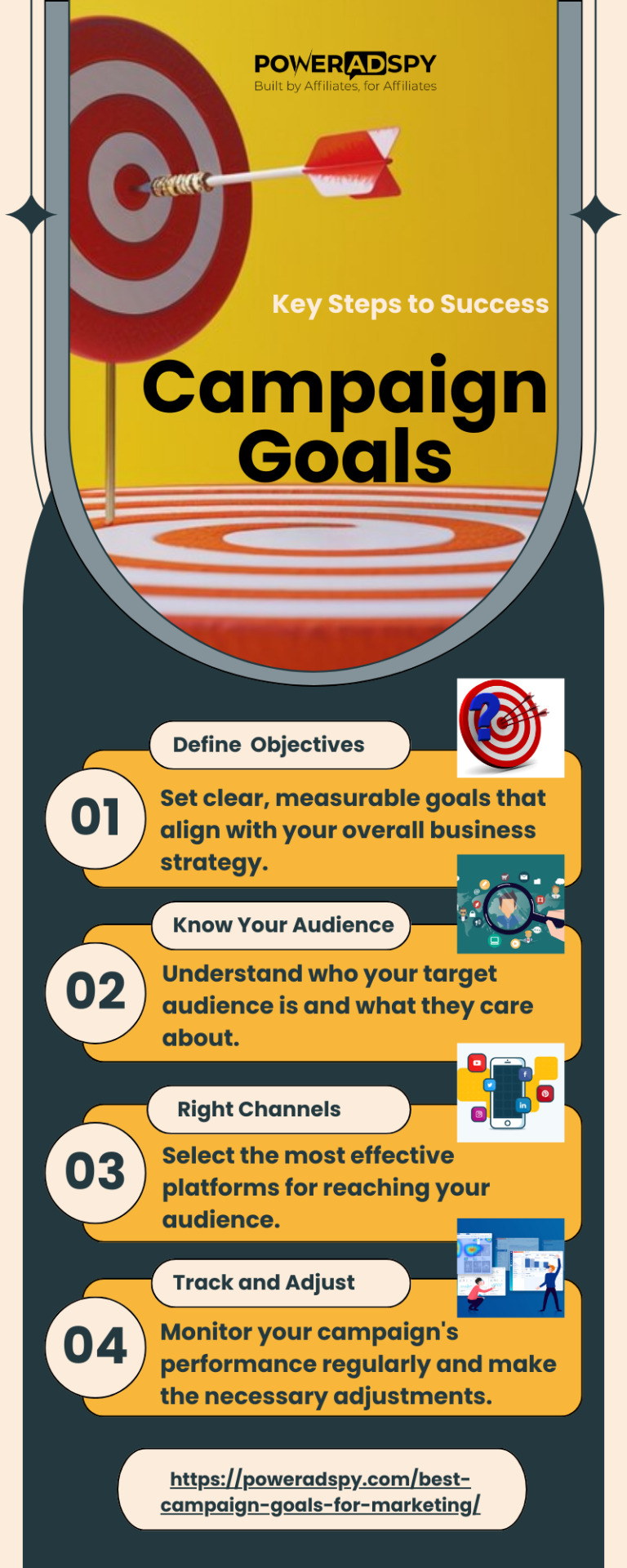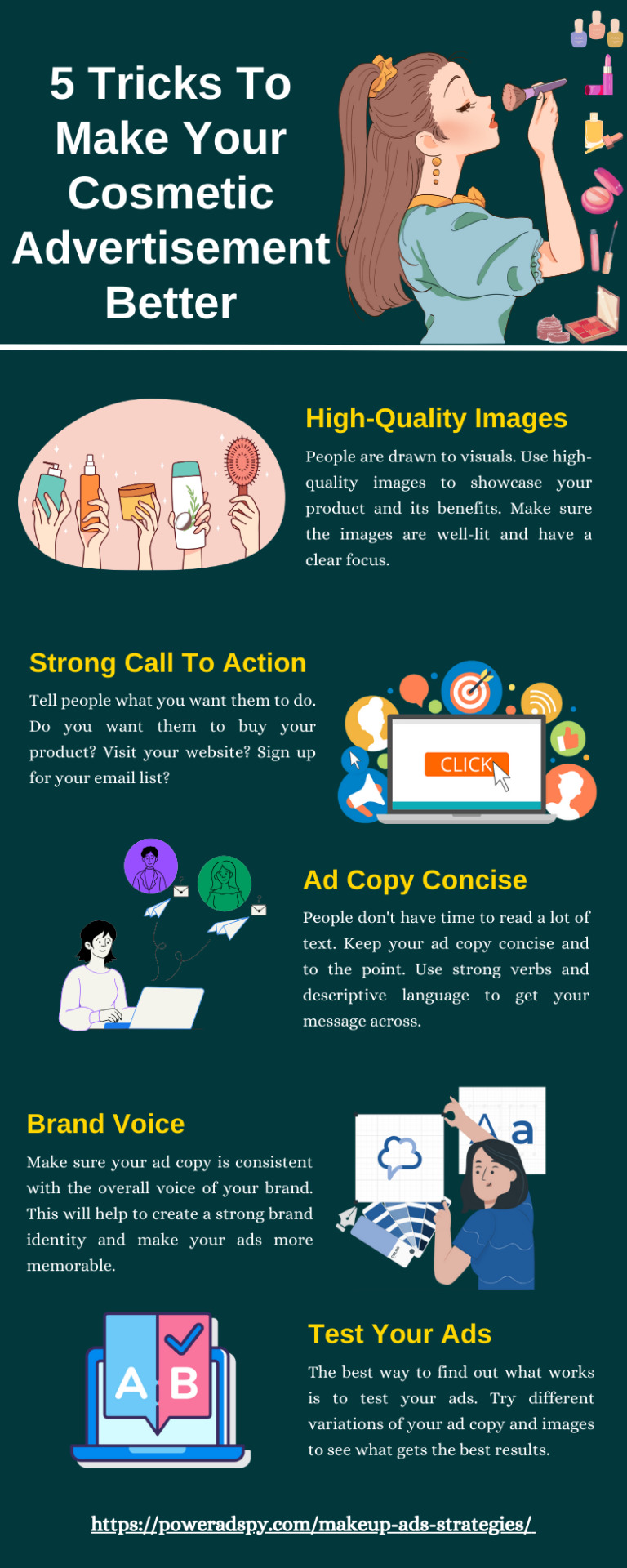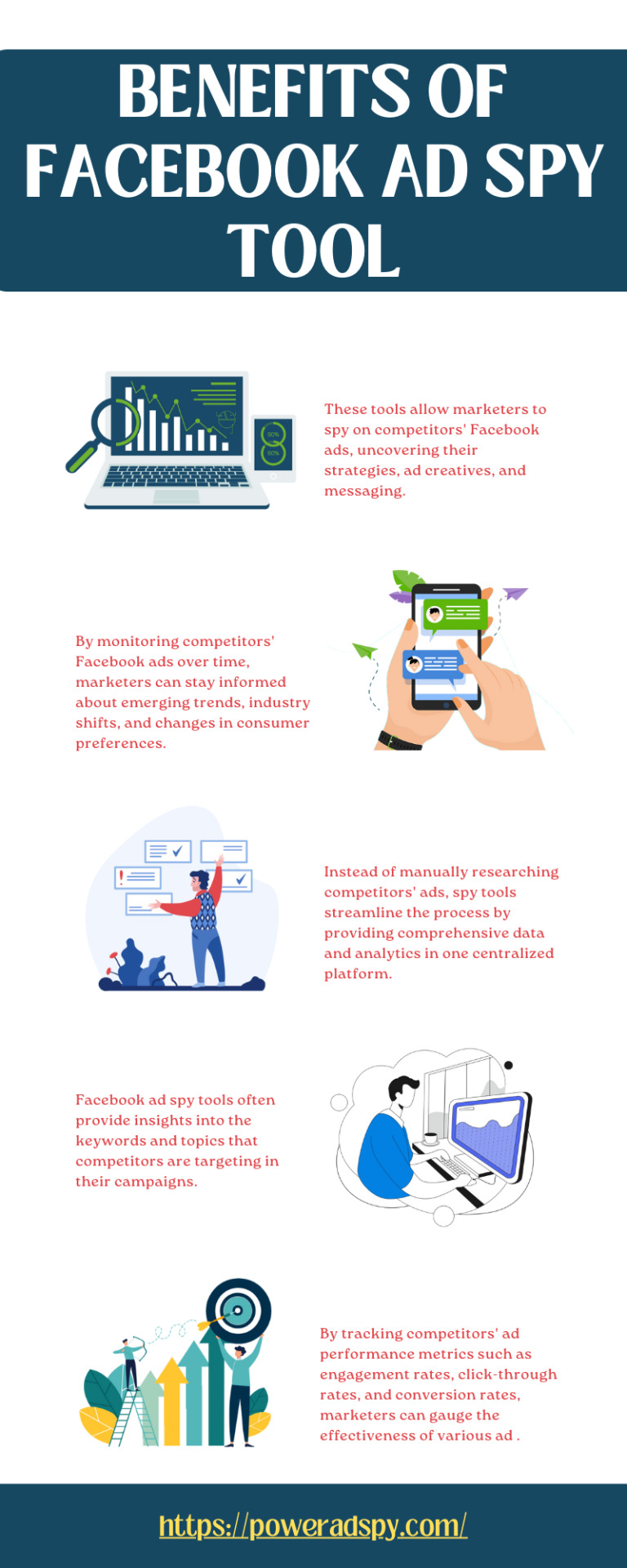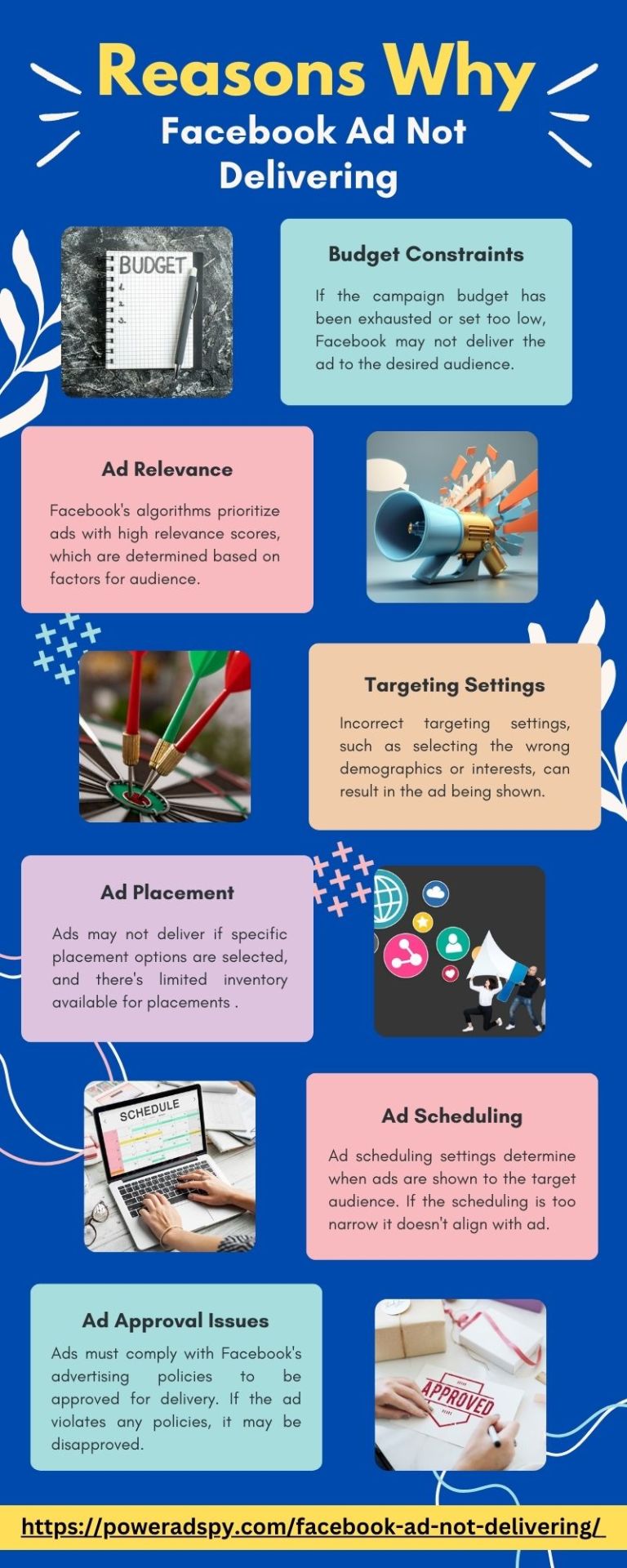#Facebook ads spy tool
Explore tagged Tumblr posts
Text

In this infographic you will learn more on campaign goals.
#campaign goals#advertising objective#campaign goals examples#facebook campaign objective#facebook ads spy tool#ad spy tools
0 notes
Text

In this infographic you will get to know about Facebook Travel Ads.
0 notes
Text

We all know how important advertisement is for a business. In this pdf, you will get to know some tips and tricks on cosmetic advertising.
0 notes
Text
Facebook Furniture Ads: Transform Your Home with Trendy Designs

In the present digital age, publicizing via social media platforms stages has become a fundamental tool for looking to advance their items and contact a more extensive crowd. With regards to the furniture business, Facebook is a strong stage for displaying popular plans and changing homes. In any case, for what reason do furniture ads on Facebook matter, and how might you take full advantage of this advertising as an open opportunity?
In this article, we'll explore the importance of Facebook furniture ads and provide valuable tips to help you create effective and engaging campaigns.
Why Do Furniture Ads on Facebook Matter?
Wide Audience Reach
Facebook is quite possibly one of the biggest social media stages in the world, with billions of clients. Advertising on Facebook permits furniture organizations to take advantage of this enormous client base, expanding the permeability of their items. This wide area assists you with associating with potential clients who are keen on furnishings and home stylistic layouts, empowering you to change their residing spaces with your stylish plans.
Targeted Advertising
Facebook offers advanced targeting on choices that allow you to arrive at explicit socioeconomics, interests, and ways of behaving. This accuracy is critical in the furniture business, where various styles and plans appeal to various crowds. By fitting your Facebook furniture advertisements to focus on the perfect individuals, you can expand the possibilities of changing leads into deals.

Visual Appeal
Furniture is a highly visual product, and Facebook's platform is designed to showcase images and videos effectively. You can create eye-catching ads that highlight the aesthetic appeal and functionality of your furniture. Visual content tends to engage users more effectively, making Facebook an ideal platform for promoting furniture and home decor.
Engagement and Interaction
Facebook encourages interaction through likes, comments, and offers. It implies that when clients go over your furniture ads, they can draw in with your image, get clarification on some pressing issues, or even offer your posts with their companions. Drawing in with possible clients on an individual level can construct trust and dependability, at last prompting more deals and changes.
Tips for the Best Facebook Furniture Ads
Now that we comprehend the reason why Facebook furniture ads matter, how about we dig into specific ways to make successful missions:

High-Quality Imagery: Invest in professional photography and use high-resolution images that showcase your furniture from different angles. Clear and visually appealing photos are more likely to grab the attention of potential customers.
Storytelling: Craft compelling accounts that go with your furniture advertisements. Share the story behind each piece, including its plan motivation, craftsmanship, and the distinction it can make in changing a home.
Video Content: Video advertisements can be inconceivably powerful on Facebook. Consider making brief recordings that show the way that your furniture can upgrade a living space or give plan motivation.
Targeted Audience: Utilize Facebook's focus on choices to characterize your optimal crowd. Consider factors like area, age, orientation, interests, and ways of behaving to arrive at potential clients probably going to be keen on your items.
A/B Testing: Explore different avenues regarding different promotion arrangements, duplicates, and pictures. Direct A/B tests to figure out what reverberates best with your crowd and change your mission in like manner.
Call-to-Action (CTA): Include a specific and convincing CTA in your promotions, guiding clients to make explicit moves like "Shop Now" or "Find out More." Make it simple for intrigued clients to explore to your site or online store.
Customer Testimonials: Share exact surveys and tributes from fulfilled clients to construct trust and believability.
Consistency: Keep a steady presentation plan to keep your crowd locked and engaged. Regular updates will help your brand stay top-of-mind and build a loyal following.
You can also watch:
youtube
Conclusion
Facebook furniture advertisement give a brilliant open door to organizations in the furniture business to associate with an expansive and drawn-in audience. Utilizing the stage's elements, you can make outwardly engaging and designated crusades that change homes with in-vogue plans. By following these tips and understanding the meaning of Facebook furniture promotions, you can upgrade your image's presence and drive deals in the steadily advancing universe of online business and online advertising.
#Facebook furniture ads#furniture advertisement#furniture store ads#ads for furniture#Facebook ads for furniture#Facebook ads spy tool#Youtube
0 notes
Text
#FacebookMarketing
#SocialMediaMarketing
#FacebookAds
#FacebookForBusiness
#FacebookGrowth
#DigitalMarketing
#SocialMediaTips
#OnlineMarketing
#MarketingStrategy
#FacebookContent
#EngagementBoost
#ContentCreation
#ContentStrategy
#SocialMediaContent
#PostEngagement
#ContentMarketingTips
#CreativeContent
#FacebookAdsTips
#FacebookCampaigns
0 notes
Text
How Ad Spy Tools Can Supercharge Your Marketing Strategy Today

In today’s competitive digital landscape, running effective ads requires more than just creativity and a catchy slogan. With the help of ad spy tools, businesses can gain valuable insights into their competitors’ strategies, helping them design more effective ads and campaigns that stand out. Ad spy tools enable brands to tap into competitive data, understand market trends, and refine their own marketing efforts for maximum impact.
What Are Ad Spy Tools?
Ad spy tools are software platforms that allow you to view and analyze your competitors’ advertising campaigns across various channels, such as Google Ads, Facebook, YouTube, and more. They provide information on ad creatives, keywords, engagement metrics, targeting methods, and budget insights. By using these tools, you get a clear view of what’s working for your competitors, empowering you to create data-driven campaigns of your own.
Key Benefits of Using Ad Spy Tools
Gain Competitor Insights

With ad spy tools, you can dive into competitors’ strategies, seeing which ads are performing well and how often they are being displayed. By examining the keywords, visuals, and messaging that drive competitor success, you can better understand what resonates with your target audience and apply similar tactics to your campaigns.
Identify Trending Content and Formats
Staying on top of trends is essential in digital advertising, where attention spans are short, and trends change quickly. Ad spy tools can highlight which types of ads (video, image, carousel) and which topics or formats are generating the most engagement. This insight allows you to stay current and keep your ads fresh, relevant, and effective.
Improve Your Ad Copy and Visuals

Studying high-performing ads provides valuable lessons in effective ad copy and design. By analyzing the tone, language, call-to-action phrases, and visual elements of successful ads, you can enhance your own ad copy and designs to capture your audience's attention and drive engagement.
Optimize Your Targeting
Many ad spy tools offer insights into the demographics and interests that competitors are targeting. By understanding who your competitors are aiming their ads at, you can refine your own audience targeting and reach the people most likely to engage with your brand. This can help you cut costs by avoiding broad or ineffective targeting.
Save Time and Resources on A/B Testing
A/B testing can be a time-consuming and costly process. Ad spy tools reduce this burden by showing you the types of ads, placements, and strategies that are already working well for others in your industry. By building on proven tactics, you can focus more of your time and budget on what’s likely to work for your brand, rather than starting from scratch.
Boost ROI with Data-Driven Decisions

Ad spy tools eliminate much of the guesswork in ad creation and targeting. When combined with value-based bidding, ad spy tools help you prioritize high-value actions, such as conversions or customer lifetime value, ensuring that your budget focuses on the most profitable opportunities.
Top Ad Spy Tools to Consider
PowerAdSpy
As a leading tool for Facebook and Instagram ads, PowerAdSpy offers detailed targeting and engagement data, making it an invaluable resource for social media-focused campaigns.
AdSpy
Known for its extensive ad database and cross-platform capabilities, AdSpy covers a wide range of channels and allows for granular ad searches across multiple industries.
SEMrush
SEMrush is a well-known keyword research tool that also provides detailed insights into competitors’ PPC campaigns, ad copies, and keywords, making it ideal for Google Ads analysis.
SpyFu
SpyFu specializes in Google Ads, providing a detailed look into competitors’ paid search strategies, including ad variations, keywords, and budget allocation.
Best Practices for Using Ad Spy Tools

Regular Competitor Monitoring
Consistently tracking your top competitors’ ad strategies allows you to stay competitive. Keep an eye on changes in their ad copy, formats, and targeting, and adapt your approach as needed.
Focus on Relevant Competitors
Rather than analyzing every competitor, focus on brands within your niche or that target a similar audience. This ensures that your insights are applicable to your own campaigns.
Use Data Responsibly
While ad spy tools provide competitive insights, use these insights to inspire rather than copy. Craft unique campaigns that align with your brand’s voice while using competitors’ success as a guide.
You can also watch: PowerAdSpy - How to Tutorial Series for Facebook Ads Spy
Conclusion
Ad spy tools like PowerAdSpy, AdSpy, and SEMrush provide valuable data to enhance your ad campaigns. By understanding what works for competitors and staying up-to-date with market trends, you can craft more effective ads, optimize targeting, and improve ROI. Leveraging these ad spy tools responsibly can give you a strategic advantage in today’s fast-paced digital advertising world, helping you stay ahead and achieve lasting success.
0 notes
Text

In this infographics, you will get to know about the benefits of Facebook ad spy tool.
1 note
·
View note
Text

PowerAdSpy is an effective Facebook ad spy tool that enables marketers to explore and analyze competitors' Facebook advertising strategies. By providing insights into ad creatives, engagement metrics, and targeting options, it helps users optimize their own campaigns, ensuring they stay competitive and maximize their return on investment.
1 note
·
View note
Text
Best 9 Tools to Spy on Your Competitor’s Facebook Ads
In the competitive world of digital marketing, having a strategic edge is crucial. Understanding how to see competitors' Facebook ads can give you valuable insights and help refine your campaigns. Utilizing ad spy tools, even free ones, can allow you to monitor your competitors' Facebook ads effectively and gain inspiration for enhancing your social media strategies.
Facebook ads spy tools are indispensable for uncovering your competitors' and audience engagement strategies. These tools enable you to spy on Facebook ads without direct access, providing valuable competitive intelligence. Whether you're looking for a free Facebook ad spy tool or a comprehensive Facebook spy tool, these resources empower you to analyze ad content, targeting strategies, and creative choices employed by your competitors.
Engaging in Facebook ads spying keeps marketers updated on industry trends and competitor activities. By effectively leveraging a Facebook spy tool, you can identify successful ad campaigns, discover innovative approaches, and mitigate risks through informed strategic decisions. Incorporating ad spying into your marketing strategy equips you with actionable insights to optimize your Facebook campaigns and achieve sustainable business growth.
Facebook Ads Spy Tools
According to Adespresso, leveraging competitors’ Facebook ads can inspire creative choices and inform strategic decisions. Here are some essential tools to spy on competitors' Facebook ads:
Adsova
Features: Extensive ad collection, daily updates, trial version.
Benefits: Provides competitive insights and creative inspiration.
Swiped
Features: Inspiration gallery, explanatory insights.
Benefits: Offers educational value and creative guidance.
Info and Ads (Facebook Tool)
Features: Free tool, location-based monitoring.
Benefits: Accessible and provides real-time monitoring.
AdEspresso
Features: Industry coverage, engagement metrics.
Benefits: Allows industry benchmarking and performance insights.
AdLeap
Features: Free analysis, support features.
Benefits: Cost-effective and serves as a learning platform.
AdSwiper’s Facebook Ad Spy Tool
Features: Free and paid versions, advanced filters.
Benefits: Customizable and time-efficient.
Social Ad Scout
Features: Global ad database, detailed filters.
Benefits: Provides global insights and granular analysis.
PowerAdSpy
Features: Extensive database, audience insights.
Benefits: Comprehensive coverage and refined audience targeting.
PayPerTrail
Features: ROI optimization, viral trend analysis.
Benefits: Provides strategic insights and alert systems.
These tools collectively provide marketers with the capability to monitor, analyze, and derive insights from competitors' Facebook ad campaigns. By using these tools, you can make informed decisions that contribute to the success of your business.
0 notes
Text

The Facebook Ad Library is a great resource for tracking popular ads. In this pdf, you will get to know how to use the FB Ad Library for tracking popular ads.
0 notes
Text
Apple to EU: “Go fuck yourself”

If you'd like an essay-formatted version of this post to read or share, here's a link to it on pluralistic.net, my surveillance-free, ad-free, tracker-free blog:
https://pluralistic.net/2024/02/06/spoil-the-bunch/#dma

There's a strain of anti-anti-monopolist that insists that they're not pro-monopoly – they're just realists who understand that global gigacorporations are too big to fail, too big to jail, and that governments can't hope to rein them in. Trying to regulate a tech giant, they say, is like trying to regulate the weather.
This ploy is cousins with Jay Rosen's idea of "savvying," defined as: "dismissing valid questions with the insider's, 'and this surprises you?'"
https://twitter.com/jayrosen_nyu/status/344825874362810369?lang=en
In both cases, an apologist for corruption masquerades as a pragmatist who understands the ways of the world, unlike you, a pathetic dreamer who foolishly hopes for a better world. In both cases, the apologist provides cover for corruption, painting it as an inevitability, not a choice. "Don't hate the player. Hate the game."
The reason this foolish nonsense flies is that we are living in an age of rampant corruption and utter impunity. Companies really do get away with both literal and figurative murder. Governments really do ignore horrible crimes by the rich and powerful, and fumble what rare, few enforcement efforts they assay.
Take the GDPR, Europe's landmark privacy law. The GDPR establishes strict limitations of data-collection and processing, and provides for brutal penalties for companies that violate its rules. The immediate impact of the GDPR was a mass-extinction event for Europe's data-brokerages and surveillance advertising companies, all of which were in obvious violation of the GDPR's rules.
But there was a curious pattern to GDPR enforcement: while smaller, EU-based companies were swiftly shuttered by its provisions, the US-based giants that conduct the most brazen, wide-ranging, illegal surveillance escaped unscathed for years and years, continuing to spy on Europeans.
One (erroneous) way to look at this is as a "compliance moat" story. In that story, GDPR requires a bunch of expensive systems that only gigantic companies like Facebook and Google can afford. These compliance costs are a "capital moat" – a way to exclude smaller companies from functioning in the market. Thus, the GDPR acted as an anticompetitive wrecking ball, clearing the field for the largest companies, who get to operate without having to contend with smaller companies nipping at their heels:
https://www.techdirt.com/2019/06/27/another-report-shows-gdpr-benefited-google-facebook-hurt-everyone-else/
This is wrong.
Oh, compliance moats are definitely real – think of the calls for AI companies to license their training data. AI companies can easily do this – they'll just buy training data from giant media companies – the very same companies that hope to use models to replace creative workers with algorithms. Create a new copyright over training data won't eliminate AI – it'll just confine AI to the largest, best capitalized companies, who will gladly provide tools to corporations hoping to fire their workforces:
https://pluralistic.net/2023/02/09/ai-monkeys-paw/#bullied-schoolkids
But just because some regulations can be compliance moats, that doesn't mean that all regulations are compliance moats. And just because some regulations are vigorously applied to small companies while leaving larger firms unscathed, it doesn't follow that the regulation in question is a compliance moat.
A harder look at what happened with the GDPR reveals a completely different dynamic at work. The reason the GDPR vaporized small surveillance companies and left the big companies untouched had nothing to do with compliance costs. The Big Tech companies don't comply with the GDPR – they just get away with violating the GDPR.
How do they get away with it? They fly Irish flags of convenience. Decades ago, Ireland started dabbling with offering tax-havens to the wealthy and mobile – they invented the duty-free store:
https://en.wikipedia.org/wiki/Duty-free_shop#1947%E2%80%931990:_duty_free_establishment
Capturing pennies from the wealthy by helping them avoid fortunes they owed in taxes elsewhere was terribly seductive. In the years that followed, Ireland began aggressively courting the wealthy on an industrial scale, offering corporations the chance to duck their obligations to their host countries by flying an Irish flag of convenience.
There are other countries who've tried this gambit – the "treasure islands" of the Caribbean, the English channel, and elsewhere – but Ireland is part of the EU. In the global competition to help the rich to get richer, Ireland had a killer advantage: access to the EU, the common market, and 500m affluent potential customers. The Caymans can hide your money for you, and there's a few super-luxe stores and art-galleries in George Town where you can spend it, but it's no Champs Elysees or Ku-Damm.
But when you're competing with other countries for the pennies of trillion-dollar tax-dodgers, any wins can be turned into a loss in an instant. After all, any corporation that is footloose enough to establish a Potemkin Headquarters in Dublin and fly the trídhathach can easily up sticks and open another Big Store HQ in some other haven that offers it a sweeter deal.
This has created a global race to the bottom among tax-havens to also serve as regulatory havens – and there's a made-in-the-EU version that sees Ireland, Malta, Cyprus and sometimes the Netherlands competing to see who can offer the most impunity for the worst crimes to the most awful corporations in the world.
And that's why Google and Facebook haven't been extinguished by the GDPR while their rivals were. It's not compliance moats – it's impunity. Once a corporation attains a certain scale, it has the excess capital to spend on phony relocations that let it hop from jurisdiction to jurisdiction, chasing the loosest slots on the strip. Ireland is a made town, where the cops are all on the take, and two thirds of the data commissioner's rulings are eventually overturned by the federal court:
https://www.iccl.ie/digital-data/iccl-2023-gdpr-report/
This is a problem among many federations, not just the EU. The US has its onshore-offshore tax- and regulation-havens (Delaware, South Dakota, Texas, etc), and so does Canada (Alberta), and some Swiss cantons are, frankly, batshit:
https://lenews.ch/2017/11/25/swiss-fact-some-swiss-women-had-to-wait-until-1991-to-vote/
None of this is to condemn federations outright. Federations are (potentially) good! But federalism has a vulnerability: the autonomy of the federated states means that they can be played against each other by national or transnational entities, like corporations. This doesn't mean that it's impossible to regulate powerful entities within a federation – but it means that federal regulation needs to account for the risk of jurisdiction-shopping.
Enter the Digital Markets Act, a new Big Tech specific law that, among other things, bans monopoly app stores and payment processing, through which companies like Apple and Google have levied a 30% tax on the entire app market, while arrogating to themselves the right to decide which software their customers may run on their own devices:
https://pluralistic.net/2023/06/07/curatorial-vig/#app-tax
Apple has responded to this regulation with a gesture of contempt so naked and broad that it beggars belief. As Proton describes, Apple's DMA plan is the very definition of malicious compliance:
https://proton.me/blog/apple-dma-compliance-plan-trap
Recall that the DMA is intended to curtail monopoly software distribution through app stores and mobile platforms' insistence on using their payment processors, whose fees are sky-high. The law is intended to extinguish developer agreements that ban software creators from informing customers that they can get a better deal by initiating payments elsewhere, or by getting a service through the web instead of via an app.
In response, Apple, has instituted a junk fee it calls the "Core Technology Fee": EUR0.50/install for every installation over 1m. As Proton writes, as apps grow more popular, using third-party payment systems will grow less attractive. Apple has offered discounts on its eye-watering payment processing fees to a mere 20% for the first payment and 13% for renewals. Compare this with the normal – and far, far too high – payment processing fees the rest of the industry charges, which run 2-5%. On top of all this, Apple has lied about these new discounted rates, hiding a 3% "processing" fee in its headline figures.
As Proton explains, paying 17% fees and EUR0.50 for each subscriber's renewal makes most software businesses into money-losers. The only way to keep them afloat is to use Apple's old, default payment system. That choice is made more attractive by Apple's inclusion of a "scare screen" that warns you that demons will rend your soul for all eternity if you try to use an alternative payment scheme.
Apple defends this scare screen by saying that it will protect users from the intrinsic unreliability of third-party processors, but as Proton points out, there are plenty of giant corporations who get to use their own payment processors with their iOS apps, because Apple decided they were too big to fuck with. Somehow, Apple can let its customers spend money Uber, McDonald's, Airbnb, Doordash and Amazon without terrorizing them about existential security risks – but not mom-and-pop software vendors or publishers who don't want to hand 30% of their income over to a three-trillion-dollar company.
Apple has also reserved the right to cancel any alternative app store and nuke it from Apple customers' devices without warning, reason or liability. Those app stores also have to post a one-million euro line of credit in order to be considered for iOS. Given these terms, it's obvious that no one is going to offer a third-party app store for iOS and if they did, no one would list their apps in it.
The fuckery goes on and on. If an app developer opts into third-party payments, they can't use Apple's payment processing too – so any users who are scared off by the scare screen have no way to pay the app's creators. And once an app creator opts into third party payments, they can never go back – the decision is permanent.
Apple also reserves the right to change all of these policies later, for the worse ("I am altering the deal. Pray I don't alter it further" -D. Vader). They have warned developers that they might change the API for reporting external sales and revoke developers' right to use alternative app stores at its discretion, with no penalties if that screws the developer.
Apple's contempt extends beyond app marketplaces. The DMA also obliges Apple to open its platform to third party browsers and browser engines. Every browser on iOS is actually just Safari wrapped in a cosmetic skin, because Apple bans third-party browser-engines:
https://pluralistic.net/2022/12/13/kitbashed/#app-store-tax
But, as Mozilla puts it, Apple's plan for this is "as painful as possible":
https://www.theverge.com/2024/1/26/24052067/mozilla-apple-ios-browser-rules-firefox
For one thing, Apple will only allow European customers to run alternative browser engines. That means that Firefox will have to "build and maintain two separate browser implementations — a burden Apple themselves will not have to bear."
(One wonders how Apple will treat Americans living in the EU, whose Apple accounts still have US billing addresses – these people will still be entitled to the browser choice that Apple is grudgingly extending to Europeans.)
All of this sends a strong signal that Apple is planning to run the same playbook with the DMA that Google and Facebook used on the GDPR: ignore the law, use lawyerly bullshit to chaff regulators, and hope that European federalism has sufficiently deep cracks that it can hide in them when the enforcers come to call.
But Apple is about to get a nasty shock. For one thing, the DMA allows wronged parties to start their search for justice in the European federal court system – bypassing the Irish regulators and courts. For another, there is a global movement to check corporate power, and because the tech companies do the same kinds of fuckery in every territory, regulators are able to collaborate across borders to take them down.
Take Apple's app store monopoly. The best reference on this is the report published by the UK Competition and Markets Authority's Digital Markets Unit:
https://assets.publishing.service.gov.uk/media/63f61bc0d3bf7f62e8c34a02/Mobile_Ecosystems_Final_Report_amended_2.pdf
The devastating case that the DMU report was key to crafting the DMA – but it also inspired a US law aimed at forcing app markets open:
https://www.congress.gov/bill/117th-congress/senate-bill/2710
And a Japanese enforcement action:
https://asia.nikkei.com/Business/Technology/Japan-to-crack-down-on-Apple-and-Google-app-store-monopolies
And action in South Korea:
https://www.reuters.com/technology/skorea-considers-505-mln-fine-against-google-apple-over-app-market-practices-2023-10-06/
These enforcers gather for annual meetings – I spoke at one in London, convened by the Competition and Markets Authority – where they compare notes, form coalitions, and plan strategy:
https://www.eventbrite.co.uk/e/cma-data-technology-and-analytics-conference-2022-registration-308678625077
This is where the savvying breaks down. Yes, Apple is big enough to run circles around Japan, or South Korea, or the UK. But when those countries join forces with the EU, the USA and other countries that are fed up to the eyeballs with Apple's bullshit, the company is in serious danger.
It's true that Apple has convinced a bunch of its customers that buying a phone from a multi-trillion-dollar corporation makes you a member of an oppressed religious minority:
https://pluralistic.net/2024/01/12/youre-holding-it-wrong/#if-dishwashers-were-iphones
Some of those self-avowed members of the "Cult of Mac" are willing to take the company's pronouncements at face value and will dutifully repeat Apple's claims to be "protecting" its customers. But even that credulity has its breaking point – Apple can only poison the well so many times before people stop drinking from it. Remember when the company announced a miraculous reversal to its war on right to repair, later revealed to be a bald-faced lie?
https://pluralistic.net/2023/09/22/vin-locking/#thought-differently
Or when Apple claimed to be protecting phone users' privacy, which was also a lie?
https://pluralistic.net/2022/11/14/luxury-surveillance/#liar-liar
The savvy will see Apple lying (again) and say, "this surprises you?" No, it doesn't surprise me, but it pisses me off – and I'm not the only one, and Apple's insulting lies are getting less effective by the day.

Image: Alex Popovkin, Bahia, Brazil from Brazil (modified) https://commons.wikimedia.org/wiki/File:Annelid_worm,_Atlantic_forest,_northern_littoral_of_Bahia,_Brazil_%2816107326533%29.jpg
CC BY 2.0 https://creativecommons.org/licenses/by/2.0/deed.en
--
Hubertl (modified) https://commons.wikimedia.org/wiki/File:2015-03-04_Elstar_%28apple%29_starting_putrefying_IMG_9761_bis_9772.jpg
CC BY-SA 4.0 https://creativecommons.org/licenses/by-sa/4.0/deed.en
#pluralistic#apple#malicious compliance#dma#digital markets act#eu#european union#federalism#corporatism#monopolies#trustbusting#regulation#protonmail#junk fees#cult of mac#interoperability#browser wars#firefox#mozilla#webkit#browser engines
602 notes
·
View notes
Text
📣 Exciting Announcement! 📣
🔥 Are you looking for the best deals on Niche Scraper Group Buy? Look no further, because we have an exclusive offer just for you! 🔥
Introducing our Niche Scraper Group Buy, where you can get access to the powerful Niche Scraper tool at a fraction of the price. 💰💪
With Niche Scraper, you can uncover winning products, spy on your competitors, and find profitable niches for your e-commerce business. 🚀🔍
But that's not all! When you join our Group Buy, you'll also get access to a supportive community of like-minded entrepreneurs who are all working towards their online success. 💪🤝
Here's what you'll get with our Niche Scraper Group Buy:
1️⃣ Full access to Niche Scraper's amazing features - product research, store analysis, Facebook ad spy, and more! 2️⃣ The ability to find winning products and hot niches that will skyrocket your sales. 3️⃣ In-depth competitor analysis to stay ahead of the game and dominate your market. 4️⃣ Exclusive access to insider tips and strategies from industry experts. 5️⃣ 24/7 support from our dedicated customer service team to ensure your success.
Don't miss out on this incredible opportunity to level up your e-commerce game with Niche Scraper Group Buy. Join now and start crushing it in your niche! 🌟💰
Click the link in our bio to secure your spot today. Limited spots available, so act fast! ⏰🔥
#NicheScraper #GroupBuy #EcommerceSuccess #WinningProducts #ProfitableNiche
5 notes
·
View notes
Text

In this Infographic, we will get to know about facebook ad not delivering.
0 notes
Text

Enhancing your furniture advertisements can significantly impact your sales and establish your brand as a leader in the industry. In this infographic, you will get to know how to advertise and make your advertisement better.
#furniture ads#furniture advertisement#ads for furniture#furniture advertising examples#Facebook ads for furniture#Facebook ads spy tool
0 notes
Text
Get Ready to Smile: Boost Your Dentist Ads with Facebook Marketing

Marketing for your dental practice has changed significantly in the digital age compared to the past. Making the most of social media platforms is crucial when you have access to such a large online audience, and Facebook is a great option. As a dentist, you offer confidence, health, and gorgeous smiles in addition to your services. Even if you're catching up with your competitors, In this article will teach you how to improve your Facebook marketing for dentist ads.
Understand Your Competition
The most essential phase in making powerful Facebook promotions is to grasp your opposition. Research other dental practices in your space to distinguish what they're doing on Facebook. Focus on their promotion crusades, content procedure, and crowd commitment. This data can give significant bits of knowledge into what works and what doesn't.
Create Engaging Content
Quality written meaning is the final deciding factor on Facebook. To stand apart from the opposition, center around making drawing, useful, and outwardly engaging substance. Think about utilizing a blend of messages, pictures, recordings, and infographics to pass on your message. Share posts that instruct your crowd about dental well-being, grandstand when changes and give tips for keeping a lovely grin.
Target the Right Audience
One of Facebook's most impressive elements is its high level of focus on choices. Guarantee your promotions contact the ideal individuals by reducing your crowd. You can focus by area, socioeconomics, interests, and ways of behaving. Make custom crowds by utilizing your site traffic or email records to retarget potential patients who have proactively shown interest in your administrations.
Use Eye-Catching Visuals
Visual allure is urgent in dental showcasing. Utilize great pictures and recordings that feature the positive results of your administrations. When pictures, patient tributes, and movements make sense strategies can enamor your crowd. Individuals need to see the outcomes you can offer.

Advertise Special Offers
Boost your Facebook advertisements by advancing unique offers or advancements. Everybody cherishes an arrangement, and this can be a strong motivating force to draw in new patients. Whether it's a markdown on teeth brightening, a free beginning discussion, or a reference program, ensure your crowd is familiar with it.
Encourage User Interaction
Facebook is a social media platform, so draw in with your crowd. Answer quickly to remarks and messages, and energize conversations. You can likewise run surveys or back-and-forth discussions to cooperate with expected patients and address their interests. An individual touch goes far in building trust.
Utilize Facebook Ads Manager
Facebook Ads Manager gives a set-up of instruments to streamline your promotion crusades. Try different things with various promotion designs, run A/B tests, and screen the exhibition of your advertisements. Change your technique in light of the outcomes, assigning your spending plan to the best missions.
Leverage Video Marketing
Video content is inconceivable and popular on Facebook, and it tends to be a unique advantage for your dental practice. Consider making enlightening recordings about different dental methods, patient tributes, or in the background looks at your facility. Recordings will generally catch and hold the consideration of your crowd better compared to static substances.

Implement a Posting Schedule
Consistency is major via virtual entertainment. Foster a posting plan that guarantees a normal progression of content. It keeps your crowd drawn in and informed about your administrations. Use booking apparatuses to design your posts.
Analyze and Adapt
Consistently examine the presentation of your Facebook promotions. Focus on measurements like active visitor clicking percentage, transformation rate, and promotion commitment. Utilize this information to ceaselessly refine your technique. What works for your rivals probably won't work for you, so be prepared to adjust and advance your methodology.
You can also watch:
youtube
Conclusion
Facebook has the potential to revolutionize dentistry marketing for your practice. You can take your dentist ads to new heights by researching your competitors, producing absorbing content, focusing on the appropriate audience, and adhering to best practices. Remember that success on Facebook requires dedication, consistent effort, and a willingness to evolve your strategy over time. Thus, get ready to smile, both in your training and in the progress of your Facebook advertising efforts!
#Dentist ads#dental ad#Facebook ads#Facebook dental ad#Facebook ads spy tool#Facebook spy tool#Youtube
0 notes
Text
5 notes
·
View notes